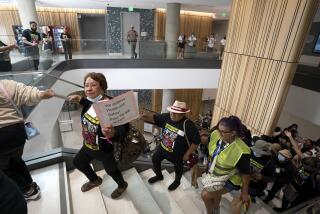Reagan’s Veto of Textile Bill Upheld in Vote by House
- Share via
WASHINGTON — The House on Tuesday narrowly sustained President Reagan’s veto of a bill to provide further trade protection for the U.S. textile industry, a bill that opponents warned would cost American consumers $20 billion a year in higher prices for clothing and shoes.
The vote for the bill was 272 to 152, but that was 11 votes short of the two-thirds majority necessary to make the bill law over Reagan’s veto.
A vocal coalition of 203 Democrats, many from the Southeast and Rust Belt, were joined by 69 Republicans in voting to override the veto. Supporting the President were 105 Republicans and 47 Democrats, including the main architects of the omnibus trade bill that Reagan signed into law in August.
The bill, nearly two years in the making, grew from a textile protection bill that Reagan successfully vetoed in 1986. In its latest version, the bill would have frozen footwear imports at 1987 levels and allowed textile and clothing imports to grow by only 1% a year over 1987 levels.
Reagan vetoed the bill last Wednesday, calling it “protectionism at its worst.” He warned that it would raise prices, narrow consumer choices and invite retaliation against U.S. exports.
A last-minute lobbying effort by the textile industry and union groups made Tuesday’s vote somewhat closer than expected. The bill had passed the House by only 248 to 150 late last month, and House Speaker Jim Wright (D-Tex.) conceded to reporters hours before Tuesday’s vote that “we’re a little bit short” of the two-thirds majority needed to override.
The House Democratic leadership regards textile protection as a good campaign issue for Democratic candidates in next month’s elections.
But Democratic presidential candidate Michael S. Dukakis did not declare himself for or against the textile bill. And congressional Democrats who had taken the lead in pushing through Congress earlier this year a bill designed to toughen U.S. trade laws led the opposition.
Particularly influential among them was House Ways and Means Committee Chairman Dan Rostenkowski (D-Ill.), who warned that overriding the veto would “save a few people’s jobs at the expense of other people’s jobs.”
Rostenkowski declared that he represented not only the textile industry, which is already doing well, but also industries that might be hurt by the retaliation that the textile bill would produce. Since Reagan vetoed the last textile bill, he said, “the domestic textile industry has seen its production, its employment, its exports and its profits increase.”
Rep. Sam Gibbons (D-Fla.), chairman of the Ways and Means trade subcommittee, argued that higher clothing prices caused by the bill’s quotas would amount to “a tax of $20 billion a year on the poorest Americans.”
Noting that the textile industry is operating at capacity, Gibbons added: “This bill rewards those who do not need to be rewarded and taxes those who do not deserve to be taxed.”
Raps Other Industries
Rep. Thomas J. Downey (D-N.Y.) warned that overriding the veto would backfire politically “because it would make the President look good and the Congress look petty” and at the same time would “increase the price of clothing to the poor.”
A fellow New York Democrat, Rep. John J. LaFalce, criticized the auto and steel industries, which have also suffered from foreign competition and supported the textile bill. He pronounced them “naive because they stand to be hurt by foreign retaliation against us if the United States should pass this law.”
Proponents of the measure warned of jobs “shipped overseas” if the U.S. textile industry did not get new protections, and they said that U.S. national security was at risk if American soldiers were forced to wear foreign-made uniforms and combat boots.
“I cry out for our country,” said Rep. Butler Derrick (D-N.C.), floor manager for the textile forces. “We’re giving away our birthright, our economic base.”
Earlier Tuesday, Derrick addressed a flag-waving rally on the Capitol steps of textile workers who had been bused in by the Fiber, Fabric & Apparel Coalition for Trade, a textile industry and labor lobby group.
“You’re here to save your jobs, because it’s the patriotic thing to do,” he told them. “Save our jobs,” they chanted in return.
More to Read
Inside the business of entertainment
The Wide Shot brings you news, analysis and insights on everything from streaming wars to production — and what it all means for the future.
You may occasionally receive promotional content from the Los Angeles Times.









